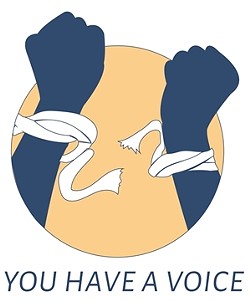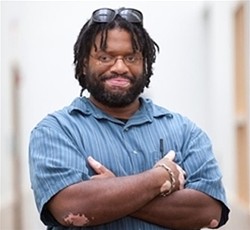
- Logo courtesy of Duane Dunston and Champlain College
How did a self-described "computer geek" at Champlain College get involved in trying to combat the global scourge of human trafficking? As he puts it, he just couldn't ignore the problem of slavery in his own backyard anymore.
When Duane Dunston graduated from Pfeiffer University in 1997, he took some time off before attending graduate school to teach English in Thailand. It was in Bangkok that Dunston got his first exposure to human trafficking. Local newspapers ran stories almost weekly about impoverished men, women and children who were forced or coerced into slavery for sex work or other labor under threats of violence to themselves and family members.
“The whole issue really stuck with me over the years," Dunston recalls, "but I was never quite sure what I could do about it because I’m a computer geek.”
Then, about five years ago, while Dunston was living in Ashville, N.C., he came across a book titled
The Slave Next Door: Human Trafficking and Slavery in America Today, by Kevin Bales and Ron Soodalter. The book inspired Dunston to write his own book — a novel, called
Twisted Greed, about a hacker who stumbles upon a human trafficking syndicate.
Dunston, who's now an
assistant professor of information security at Champlain College in Burlington, figured out another way to put his computer skills to work helping human trafficking victims in this country: He's built a mobile app, called "You Have a Voice,"(YHAV). It enables rescuers to better communicate with suspected victims in their native languages, then assess the nature of their circumstances. Dunston hopes that by allowing clients to answer sensitive and potentially embarrassing questions by responding to the mobile app rather than speaking directly to a police officer, YHAV will help reduce the reluctance, fear and shame that often keeps victims from coming forward.
Human trafficking — or the enslavement of men, women and children through force, fraud or coercion for financial gain — is now a $150 billion global industry. Though there are no official estimates of the number of human trafficking victims in the United States, new cases are reported each year in all 50 states, according to the
Polaris Project, a nonprofit advocacy group that runs the National Human Trafficking Resource Center and its 24-hour hotline.
That includes in Vermont, where cases of human trafficking have been reported in
agriculture, the
restaurant industry and the
underground sex trade, to cite just a few examples. Indeed, as
Seven Days discovered when uncovering those cases, significant language and cultural barriers, as well as fears of arrest and deportation, often kept victims from coming forward to report their own enslavement.
But Dunston's app, which is still in the beta-testing phase, aims to overcome many of those barriers. YHAV provides a series of multiple-choice questions that were first developed by the
Vera Institute of Justice in New York City to elicit more accurate and honest answers from trafficking victims. The app asks those questions in five different languages: English, French, Spanish, Arabic and Mandarin. The client can then respond, either by using the mobile device itself or by answering verbally. For clients who are illiterate or have limited reading skills, the app can also ask the questions in audio form. Flags of various nations help the investigator identify the language the client speaks.
Dunston's goal is to offer the questionnaires in at least the top-10 languages identified by the United Nations as those most commonly spoken by trafficking victims. Ultimately, he plans to make the app available on various mobile devices and eBooks at no cost to law enforcement and other first responders.
But first, Dunston will present YHAV to the next training conference of the
International Association of Human Trafficking Investigators, which will be held May 27-29 in Clearwater Beach, Fla. There, Dunston will officially unveil the app and invite investigators to provide feedback on exactly what they want the app to do with all the data it gathers. For example, police may want a scorecard that assesses the victim's risk of exploitation, provides an indicator of the presence of other trafficking victims and/or recommends immediate actions. As Dunston emphasizes, “I want to hear from first responders what
they need. I don’t want to guess at what they need."
What Dunston himself needs is funding: Several months ago, students in Champlain College's "Publishing in the 21st Century" class helped him launch a crowdsourcing fundraiser through the college's
"Make a Gift" page to raise money for the app's ongoing development. Already, the campaign has raised about $2,000 toward the $30,000 goal Dunston says is needed to translate the app into 10 different languages. As he puts it, “The more languages, the more people we can serve.”













Comments
Comments are closed.
From 2014-2020, Seven Days allowed readers to comment on all stories posted on our website. While we've appreciated the suggestions and insights, right now Seven Days is prioritizing our core mission — producing high-quality, responsible local journalism — over moderating online debates between readers.
To criticize, correct or praise our reporting, please send us a letter to the editor or send us a tip. We’ll check it out and report the results.
Online comments may return when we have better tech tools for managing them. Thanks for reading.